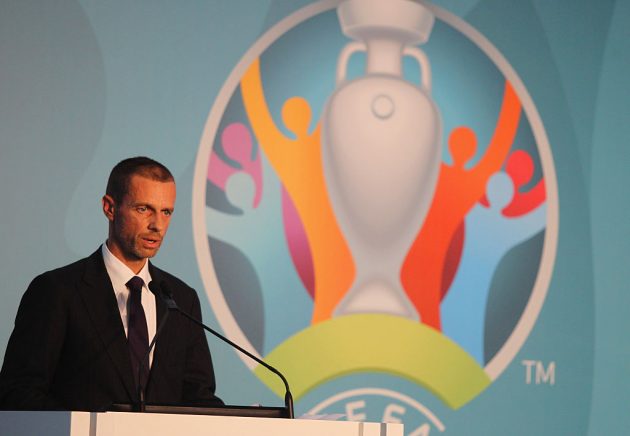It feels symbolic that two of the biggest football transfers of the summer should precede the death knell for financial fair play, the spending containment rules that are now to be replaced with a wage cap and a luxury tax.
Paris Saint-Germain’s signing of Lionel Messi and Manchester City’s £ 100million Premier League record from Jack Grealish may not have knocked out the Financial Fair Play (FFP), nor did they appear to break the rules .
But that wasn’t necessary either: through legal challenges and political maneuvers, Europe’s richest clubs have fatally weakened the FFP to the point where they can do anything they want.
Barcelona’s financial plight, meanwhile, shows that the rules introduced a decade ago are not even capable of protecting clubs, let alone improving the competitive balance.
“Clubs and fans have lost confidence in the old system,” says Simon Leaf, head of sport at Mishcon de Reya. “This is an opportunity for Uefa to regulate and rethink these things.”
The European umbrella organization Uefa is said to have agreed on a new, two-pronged regulatory system to replace FFP. It includes a wage cap linked to a luxury tax and is expected to be formally proposed next month.
The salary cap could be a hard cap – in other words, a fixed amount – or a soft cap based on a percentage of a club’s revenue; a figure of 70 percent was discussed.
A club that has exceeded its upper salary limit would have to pay a “tax” of 100-200 percent of the additional expenses in one pot, which is then redistributed to other teams.
Neither the wage cap nor the luxury tax are new concepts; both are widely used in US sports, particularly basketball and baseball, while the former exists in the English rugby union.
However, industry insiders, economists and lawyers have raised serious questions about whether the new system proposed by UEFA is suitable for European club football and can be successful where FFP has failed.
Why a salary cap is easier than FFP – but still limited
Perhaps the main benefit of replacing the FFP with a salary cap is that it should be easier to set how much each club can spend.
Where FFP was about profit and loss and that calculation was falsified by allowing clubs to deduct expenses for certain items such as youth development and stadium infrastructure, a salary cap is all about income.
So with Manchester City making £ 400m and Uefa’s wage cap set at 70 percent, the Premier League champions know they can spend £ 280m a year on their payroll.
It is also clear that, perhaps contrary to popular belief, a majority of clubs want some kind of spending rule; even the “dirty dozen” rebels of the European Super League intended to limit their salary expenditures to 55 percent of revenues.
A salary cap can be a preferred method of cost control for clubs as it would allow them to quote it in negotiations with players in order to contain wage inflation.
But that is just one example of why the proposals are fraught with legal issues.
According to sports law expert Darren Bailey, Uefa is fundamentally restricted in the strict regulation of clubs, as there is uncertainty about the extent to which European courts support the umbrella organization.
The failed outlier of the European Super League gave Juventus, Barcelona and Real Madrid a sustained legal challenge to Uefa’s dual role as promoter and regulator.
Until it is resolved, Uefa can only offer “one-arm behind-the-back regulation”, says Bailey, who shaped the legal framework for the football association and world rugby and is now a consultant at Charles Russell Speechlys.
“The easier you are to touch, the less disruptive you are to the operation of the market and those big clubs, the less susceptible you are to legal challenges,” he adds.
Old litigation that kept FFP persistent will likely stick out new rules
Then there are the interests of players and agents that the English Football League (EFL) bosses learned the hard way last season that cannot simply be ignored.
At the height of the pandemic, the EFL secured an agreement between the first and second division clubs to introduce a £ 2.5m salary cap. After half a season, the PFA players’ union had made it.
Salary caps have worked in the US, but the landscape is very different there, with closed leagues, collective bargaining, more equitable income distribution and a completely different transfer system.
Buying in from players’ unions was key. The general secretary of the world football association Fifpro, Jonas Bär-Hoffmann, has described upper salary limits as “philosophically and economically incompatible with a replacement system”, which is ominous for Uefa.
 Manchester City, who battled Uefa for financial fair play, signed Jack Grealish for £ 100m this summer (Getty Images)
Manchester City, who battled Uefa for financial fair play, signed Jack Grealish for £ 100m this summer (Getty Images)
The legal consensus is that Uefa will be able to replace the FFP with a soft cap and luxury tax without having to wait for European court rulings regarding the European Super League.
But old arguments that have persisted FFP, such as how much a club had legitimately generated – a feature of disputes between Qatar-sponsored PSG and Abu Dhabi-funded City – are unlikely to go away without very strict guidelines.
“The details are important,” says Bailey. “The narrower the definition of income [applied by Uefa] the more likely it is to have an effect. “
Meanwhile, US sport has shown that upper limits “can lead to under-reporting of salaries / over-reporting of income,” says the economist Professor Thomas Hoehn of Imperial College. “Significant surveillance would be required.”
Why the competitive balance salary cap could be even worse
Even in the scenario where Uefa is able to effectively apply a wage cap and luxury tax, there is little evidence that it will achieve one of its most important goals: promoting competition.
“The benefit of having a salary cap is based on a competitive balance,” adds Hoehn, co-author of the influential research paper The Americanization of European Football. “It depends on the details, but there are no guarantees and can make it even more difficult for smaller teams.”
Using a percentage of sales as a salary cap, for example, gives larger clubs an obvious advantage and “bakes into a competitive imbalance,” says Bailey.
Unless Uefa includes threats to ban repeat offenders – a measure believed to have been debated – a luxury tax alone may not be a sufficient deterrent for the richest clubs.
“The problem is that financial regulation does not create a level playing field. I don’t think that’s going to change, ”says Leaf. “If anything, it will likely get worse. It may give the clubs an opportunity to work their way out of a problem. “
So what’s the answer? Some form of regulation is required; As established, this is what most clubs want and Uefa can argue, with some justification, that FFP was by and large an advantage.
It has made European football more financially sustainable; Uefa reported in 2018 that the clubs rose from a loss of 1.7 billion euros in 2011 to a profit of 600 million euros. But for FFP, far more clubs could have been prone to bankruptcy during the pandemic.
And while it may not seem so urgent in the Premier League, there is a competitive imbalance problem across the continent, including in the other European Big Five leagues where Bayern Munich, Juventus, PSG and Spain’s Big Two have enjoyed sustained dominance to have.
 Uefa (President Aleksander Ceferin pictured above) is expected to come up with proposals in September to replace FFP with a wage cap and a luxury tax (Getty Images)
Uefa (President Aleksander Ceferin pictured above) is expected to come up with proposals in September to replace FFP with a wage cap and a luxury tax (Getty Images)
One solution would be to tighten squad sizes, argues Bailey. A firm cap on the number of players a team could register would result in a “more effective talent distribution process” as clubs would not be able to store talent.
Another way to address the problem would be to close loopholes in revenue and related party transactions, such as state-owned companies that invest in clubs that are effectively the same state, says Leaf. City’s sponsorship contracts with the Etihad airline and PSG’s contracts with the Qatar Tourism Agency were examined intensively on this basis.
In the event that the domestic leagues of Uefa have followed suit with the introduction of an upper salary limit and a luxury tax system, in Hoehn’s opinion, promoters should “have more investment freedom in the medium term”.
However, it seems inevitable that Uefa’s next regulatory system, however applied, will not eliminate the problems of the FFP, only reformulate them.
Solving the problems of football may require more fundamental changes, says Bailey: creating the “coherent general financial regulatory structure” that the game lacks.
“The concept of Americanization – or privatization – of sport is really on the cutting edge,” he adds.
“Picking out small elements of the American model to fit into an entirely different European multi-jurisdictional model has potentially unintended consequences.
“It feels like a really important moment: where we are with the European legal cases drifting through the courts, the situation after the pandemic and the big club crisis.
“Is now the perfect time to find a solution that solves all of these problems at once?”